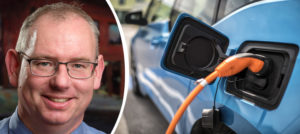By Alan Wilson, Managing Director, SELECT, the trade association for the electrical contracting industry in Scotland
With only a few weeks left until the UN Climate Change Conference – AKA COP26 – delivering effective solutions to the growing environmental crisis has never been more important.
Leaders will meet in Glasgow from 31 October 31 to 12 November to discuss how to hit climate targets, including securing net zero by mid-century and keeping global warming to below 1.5oC.
There is no doubt that the electrical industry is committed to help in this fight against global catastrophe and we have the skills and innovation at our fingertips – but leaders must have the courage to make the green revolution a reality.
Without the vision to look ahead and recognise that we need these solutions NOW, nothing will change and we will plunge our planet even further into crisis, endangering our environment and populations for generations to come.
To achieve the demanding net zero reductions they aspire to, it is therefore vital for leaders at this upcoming summit to understand what it takes to turn their vision into a practical reality.
Making our voices heard
Tackling the climate crisis before it is too late means cooperating and collaborating like never before to find real and practical solutions to reducing carbon impacts across the world.
Climate change is no respecter of boundaries and will affect us all if we don’t act immediately, and those who work across the built environment are ready to play a massive part if they are given the right tools to do so.
Climate change isn’t something that’s going to happen in ten or 20 years’ time – it’s real, it’s happening today and we don’t have a second to spare if we are to stop it getting worse.
All of us who work in the electrical industry therefore have a duty to make our voice heard and repeat the message that the technology and techniques that can make a difference to tomorrow are already here and need to be rolled out today.
Without these voices being heard, and our leaders making real change at COP26, we will just continue to sleepwalk into disaster and leave a legacy that no one will be able to repair.
Certainty and momentum are key
As a sector, there are also two key words which we also need to hear and embrace: certainty and momentum.
The industry needs to know its clear direction of travel and to be given bite-sized chunks of information to help it stay on course. And it also needs to keep pace with any promises made, so we can’t have COP26, and then say, ‘Wasn’t that jolly good?’ and all go back to our day jobs as if nothing has changed.
The sector has been discussing this kind of work for many, many years and there have been several false dawns. But we’re past that now and need to move forward to the next stage if the industry is to successfully build on the outcome of COP26.
The importance of investment
We’ve also said for many years that the future is electric, but I think we can say ‘the now is electric’ because electrification is already starting to drive our heat, light and transport demands.
It’s therefore vital that we have investment in the sector; we currently have a good workforce, with a record number of apprentices recruited in Scotland so far this year, but upskilling is definitely necessary to help make our sector more agile when it comes different kinds of installations.
For example, we’re probably all aware of tried-and-tested innovations like photovoltaic panels, battery storage and electric vehicle (EV) chargers, which the industry is already installing in homes and offices across Europe.
But we’re also keen to get involved in ‘prosumer’ activity, where individual houses, groups of houses or even shopping centres can effectively come together, take themselves off grid and generate their own electricity, whether that’s wind, solar or a mix of both.
This kind of thing isn’t rocket science per se, but it’s here and it’s happening, and we need to grab such opportunities, take advantage of them and make them work for us.
There are lots of similar opportunities in the electrical industry and I’m sure we’re all very excited to be part of a sector which is going to be an integral part of all our lives going forward.

